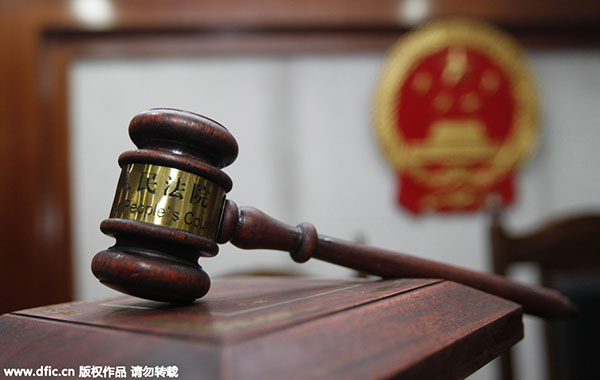Nice way of getting rid of outdated documents
Updated: 2016-06-27 08:16
(China Daily)
|
||||||||
 |
|
A gavel in a court. [Photo/IC] |
At its recent executive meeting, the State Council, China's Cabinet, announced the abolition of a large number of policy documents that are incompatible with extant laws and regulations, and unsuitable for the country's economic and social development. Following are some media outlets' comments on the government move:
GMW.cn:
After having previously cancelled 489 documents, the State Council announced a few days ago that another 506 such documents would be abrogated. The central government's consistent attitude toward obsolete documents manifests its reformist spirit and belief in the fact that "the arrow cannot be reversed once shot". The central government's efforts to simplify procedures, delegate some of its powers to lower-level governments and optimize services also signify it is committed to honoring its promise of giving the market a decisive role to play in the distribution of resources.
The abolition of nearly 1,000 policy documents also means the government is now ready to embrace a new stage of economic development. After serving their purpose in the times they were needed, the documents had become obsolete and thus had to be phased out. This is a normal phenomenon in governance and essential for further reforms.
To create a favorable environment for the "mass start-up and mass innovation" campaign, promote an innovation-driven development strategy and make the market play a bigger role, the government has to reduce its presence and give market players more space to function well. The abolition of the obsolete documents also marks a step closer to the building of a "smaller government and bigger market".
But good measures need effective implementation. So while scrapping those out-of-date documents, the government should also take measures to ensure lax implementation does not minimize the effects of its move.
Xinhuanet.com:
Given that the State Council decided in 2015 to review within three years all documents it has issued since the founding of New China, the recent scrapping of the documents shows its determination to implement the decision.
The government has decided to do away with obsolete documents to pragmatically use its "visible hand" and to make the market play a really decisive role in economic activities. To comprehensively deepen reforms, the government does need to re-forge its relations with society and the market, which demands minimum interventions in the market and society and allowing the market to effectively use its "invisible hand", especially in the distribution of resources.
To better use its "tangible hand", the government should enhance the authority and seriousness of its policies and documents. If the policy documents not compatible with the current economic and social development remain in circulation, the authority of even necessary government documents could be weakened. Only through the effective use of the "visible" as well as "invisible" hands of the government and the market can a win-win socio-economic atmosphere be created.
Ifeng.com
While effectively restraining the abuse of government power, the revoking of government documents incompatible with the current situation will also release the vitality of society and the market.
Objectively speaking, those administrative documents once served as important supplements to laws and regulations, and played important roles in promoting economic development, social progress and public well-being. But their over-administrative characteristics made them suitable only for certain periods, and with the passage of time they lost their utility and importance. Thus, their abolition was badly needed to create more space for the survival and development of enterprises.
The government's efforts to scrap obsolete documents reflect its resolve to define its power boundary and bring its activities under the legal framework. But while abolishing those obsolete documents, the central and local governments also need to strengthen supervision and take measures to prevent similar ones from being enacted in the future.
- US urged not to rock the boat by flexing its muscles
- UK's EU referendum polls show 'Leave', 'Remain' tied up
- DPRK yet to confirm suspected missile launches
- Chinese panda expert concerned by sick panda in US
- British MPs pay tribute to murdered MP Jo Cox
- DPRK deploys Musudan ballistic missile in east coast

 UK votes to LEAVE the EU in historic referendum
UK votes to LEAVE the EU in historic referendum
 Aussie Ben Simmons picked by 76ers as No 1 in NBA Draft
Aussie Ben Simmons picked by 76ers as No 1 in NBA Draft
 Ancient scroll's digital art show staged in Beijing airport
Ancient scroll's digital art show staged in Beijing airport
 University students go underwater to celebrate graduation
University students go underwater to celebrate graduation
 Ten photos from around China: June 17 - 23
Ten photos from around China: June 17 - 23 Rising above the clouds: Mist envelops Qingdao
Rising above the clouds: Mist envelops Qingdao
 In pictures: Countdown to Brexit referendum
In pictures: Countdown to Brexit referendum
 Top 10 classic Walt Disney animated films
Top 10 classic Walt Disney animated films
Most Viewed
Editor's Picks

|

|

|

|

|

|
Today's Top News
Abe's blame game reveals his policies failing to get results
Ending wildlife trafficking must be policy priority in Asia
Effects of supply-side reform take time to be seen
Chinese State Councilor Yang Jiechi to meet Kerry
Chinese stocks surge on back of MSCI rumors
Liang avoids jail in shooting death
China's finance minister addresses ratings downgrade
Duke alumni visit Chinese Embassy
US Weekly

|

|







